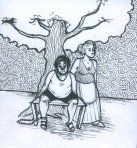 Every time somebody asks me to pick my favourite one, whatever the topic is, I am never that prompt and if I attempt to give an answer I change my mind after two seconds. The truth is that actually but I don’t have THE song , THE memorable movie, THE actor, THE band, THE man of my life……uhmmm, oh no, THE man I have (oooops) ; I’ve got many options that have changed according to age, situations, places. But if you instead ask me what book I loved THE most, well, in this case no doubts cloud my mind: it is One Hundred Years of Solitude by Gabriel García Márquez. Applause.
Every time somebody asks me to pick my favourite one, whatever the topic is, I am never that prompt and if I attempt to give an answer I change my mind after two seconds. The truth is that actually but I don’t have THE song , THE memorable movie, THE actor, THE band, THE man of my life……uhmmm, oh no, THE man I have (oooops) ; I’ve got many options that have changed according to age, situations, places. But if you instead ask me what book I loved THE most, well, in this case no doubts cloud my mind: it is One Hundred Years of Solitude by Gabriel García Márquez. Applause.
 I am not exaggerating If I say that, when I read it long time ago, I fell under the spell of the magnificent prose of the Colombian author after only a few words. It was first sight love. It is just like when you are convinced to prefer a blond-haired, blue-eyed, Prince Charming looking kind of man and you end up seduced by his dark opposite and with moustache too. This novel, in fact, was so different from those I had read at university and loved till then. It had an unusual intoxicating flavour that totally engaged my mind and senses so that in a second I could see or better be there, in Macondo, the city of mirrors, sweating under the lazy south American sun and hearing a melancholy air, just like one of the Buena Vista Social Club: “Óigame compay! No deje camino por coger la vereda………..”.
I am not exaggerating If I say that, when I read it long time ago, I fell under the spell of the magnificent prose of the Colombian author after only a few words. It was first sight love. It is just like when you are convinced to prefer a blond-haired, blue-eyed, Prince Charming looking kind of man and you end up seduced by his dark opposite and with moustache too. This novel, in fact, was so different from those I had read at university and loved till then. It had an unusual intoxicating flavour that totally engaged my mind and senses so that in a second I could see or better be there, in Macondo, the city of mirrors, sweating under the lazy south American sun and hearing a melancholy air, just like one of the Buena Vista Social Club: “Óigame compay! No deje camino por coger la vereda………..”.
 Bedtime stories have always had the function to make kids, even the most reluctant ones, drift off to sleep. When you pick a book of fairy tales and start reading slowly: “Once upon a time…..” you realise that these words have the amazing power to ease the mind of every child immediately, because they let him quit the little frustrations of the present and jump into the world of timeless magic with the eyes of wonder. And I, as a child, fell in a literary dream soon after Marquez‘ s first words:
Bedtime stories have always had the function to make kids, even the most reluctant ones, drift off to sleep. When you pick a book of fairy tales and start reading slowly: “Once upon a time…..” you realise that these words have the amazing power to ease the mind of every child immediately, because they let him quit the little frustrations of the present and jump into the world of timeless magic with the eyes of wonder. And I, as a child, fell in a literary dream soon after Marquez‘ s first words:
“At that time Macondo was a village of twenty adobe houses, built on the bank of a river of clear water that ran along a bed of polished stones, which were white and enormous, like prehistoric eggs. The world was so recent that many things lacked names, and in order to indicate them it was necessary to point.”
“At that time?” What time? The novel is actually set in the early 1800s until the mid 1900s, however, Marquez puzzles us telling that Macondo was already a village, but things had yet to be named, therefore all at once he pushes us back to the beginning of time as this is a clear allusion to the biblical tale of Adam naming the animals. Henceforth we understand that Macondo was a sort of Garden of Eden, pure, uncontaminated, enchanted, where time is no clock time and the space is surrounded by an aura of magic. José Arcadio Buendía, the founder of Macondo, and his wife Úrsula Iguarán, as new Adam and Eve, are the progenitor of the Buendía clan.
 The age of innocence will be broken by the coming of gypsies, who will bring with them the wonders of magic and technology. In particular one of them Melquíades befriends Arcadio Buendia, who is a curious, intelligent sort of man, and guides him in his intellectual pursuits. Arcadio, turning his back to the ancient world of magic in favour of scientific experimentation, eats his forbidden fruit, thus pushing his family into the world of modernity and hastening the end of Macondo’s Eden-like state as well. His incessant, obsessive quest will drive him mad eventually, till he is seen as a danger to the family. Therefore Ursula decides to make the Buendía backyard his new abode, where he will pass his last years tied to a tree . Alone.
The age of innocence will be broken by the coming of gypsies, who will bring with them the wonders of magic and technology. In particular one of them Melquíades befriends Arcadio Buendia, who is a curious, intelligent sort of man, and guides him in his intellectual pursuits. Arcadio, turning his back to the ancient world of magic in favour of scientific experimentation, eats his forbidden fruit, thus pushing his family into the world of modernity and hastening the end of Macondo’s Eden-like state as well. His incessant, obsessive quest will drive him mad eventually, till he is seen as a danger to the family. Therefore Ursula decides to make the Buendía backyard his new abode, where he will pass his last years tied to a tree . Alone.
 The village starts to establish contact with other towns in the region, thus slowly abandoning their solitary state of innocence. This will make Macondo and Arcadio’s descendants experience the real, brutal side of life: violence, tragedies, wars. However, despite the harsh realism, what binds the incessant whirl of events is magic, rather than clock time, as all the characters become actors of Melquíades’ prophecy, whose meaning will be revealed only in the end. Therefore they are not free, they are doomed.
The village starts to establish contact with other towns in the region, thus slowly abandoning their solitary state of innocence. This will make Macondo and Arcadio’s descendants experience the real, brutal side of life: violence, tragedies, wars. However, despite the harsh realism, what binds the incessant whirl of events is magic, rather than clock time, as all the characters become actors of Melquíades’ prophecy, whose meaning will be revealed only in the end. Therefore they are not free, they are doomed.
 One Hundred Years of Solitude belongs to that literary genre which is defined magic realism. Professor Matthew Strecher defines magic realism as “what happens when a highly detailed, realistic setting is invaded by something too strange to believe.” A beautiful example of magic realism is the story of Meme (she belongs to the fifth generation of Buendias) and Mauricio Babilonia. They love each other secretly, and must escape her mother’s control. Meme has a peculiarity: wherever she goes she is followed by a cloud of butterflies and for this reason she will be found with him by the guard her mother has hired. He will shoot at him and Mauricio will end up paralyzed for the rest of his life and Meme in a convent. Don’t try to understand why butterflies followed Meme, you’ ve got to believe it.
One Hundred Years of Solitude belongs to that literary genre which is defined magic realism. Professor Matthew Strecher defines magic realism as “what happens when a highly detailed, realistic setting is invaded by something too strange to believe.” A beautiful example of magic realism is the story of Meme (she belongs to the fifth generation of Buendias) and Mauricio Babilonia. They love each other secretly, and must escape her mother’s control. Meme has a peculiarity: wherever she goes she is followed by a cloud of butterflies and for this reason she will be found with him by the guard her mother has hired. He will shoot at him and Mauricio will end up paralyzed for the rest of his life and Meme in a convent. Don’t try to understand why butterflies followed Meme, you’ ve got to believe it.
 I know that the greatest objection of the many readers who couldn’t finish the novel, is the great number of characters, who more or less share the same names: Aureliano or Jose Arcadio. Frustrated by the impossibility of memorizing characters and associate them to their actions, they just surrendered. As far as I am concerned, I didn’t record any name, I just went with the flow of narration, after all if Marquez had wanted me to recognize them as singular beings, he would have taken the trouble of choosing other names. All the characters together, in fact, represent human nature as un unchangeable whole. “Óigame compay! No deje camino por coger la vereda………..”.
I know that the greatest objection of the many readers who couldn’t finish the novel, is the great number of characters, who more or less share the same names: Aureliano or Jose Arcadio. Frustrated by the impossibility of memorizing characters and associate them to their actions, they just surrendered. As far as I am concerned, I didn’t record any name, I just went with the flow of narration, after all if Marquez had wanted me to recognize them as singular beings, he would have taken the trouble of choosing other names. All the characters together, in fact, represent human nature as un unchangeable whole. “Óigame compay! No deje camino por coger la vereda………..”.

